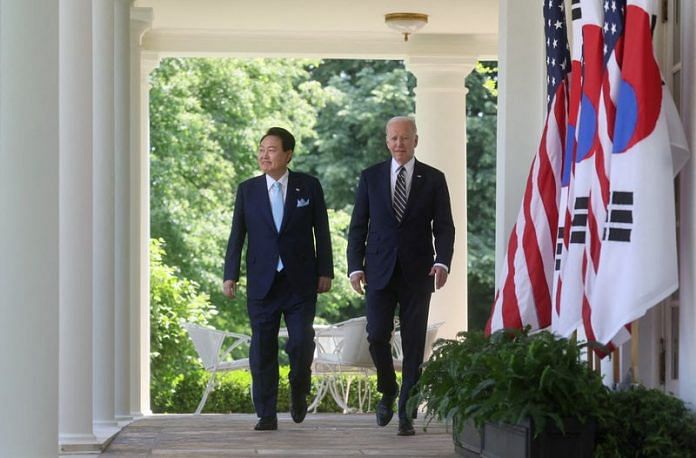By Jamie McGeever
(Reuters) – A look at the day ahead in Asian markets from Jamie McGeever.
The top-tier Asian economic data cupboard on Thursday is bare, meaning regional markets will probably feed off U.S. earnings, banking sector woes, debt ceiling developments and geopolitical events for direction.
From a corporate perspective, Wall Street this week appears to have slipped into a ‘push and pull’ between upbeat results – especially mega tech – and deepening concern over the health of small and regional U.S. banks.
Microsoft and Alphabet ‘beats’ on Tuesday helped push the Nasdaq up 0.5% on Wednesday but the Dow Jones and S&P 500 fell 0.7% and 0.4%, respectively. This was followed up on Wednesday by Meta, whose shares surged 12% after hours after the company’s strong earnings beat.
First Republic Bank’s shares plunged to another record low, but PacWest Bancorp jumped 8% after beating estimates and stemming deposit outflows. The regional banking index rose for the first day in five.
Avid readers of the geopolitical tea leaves in Asia will be kept busy after South Korea’s President Yoon Suk Yeol met U.S. President Joe Biden in Washington, and China’s Xi Jinping held talks with Ukraine’s Volodymyr Zelenskiy – their first direct communication since Russia invaded Ukraine last year.
Biden said maintaining U.S. access to Korean semiconductors is not designed to hurt China. Beijing may beg to differ, and may be equally wary of Biden and Yoon’s pledge to deepen cooperation on deterrence against North Korea and strengthen trilateral ties with Japan.
Washington welcomed Xi’s call with Zelenskiy, but may privately question Xi’s sincerity and motives reaching out to the Ukrainian leader 14 months after Russia’s invasion but only days after the furor sparked by China’s envoy to Paris.
On the macro front, Beijing will no doubt welcome news that the yuan became the most widely used currency for cross-border transactions in China in March, overtaking the dollar for the first time. The yuan was used in 48.4% of transactions, Reuters calculated, while the dollar’s share declined to 46.7%.
(Graphic: Foreign central banks & US Treasuries flows – https://fingfx.thomsonreuters.com/gfx/mkt/zdvxdkalevx/UST_Flows_Fed.jpg)
The ‘de-dollarization’ debate has picked up again recently, but the latest flows estimates from two Fed economists show central banks remain buyers of U.S. Treasuries and added to their holdings in the first two months of the year.
China added to its Treasuries holdings in February, but not enough to make up for the fairly heavy selling in January.
Asian markets will also be sensitive to the U.S. debt ceiling standoff. So far, stress has only flared up in the U.S. T-bills market, but that could spread quickly if the Republican bill in the House is voted down later on Wednesday.
Here are three key developments that could provide more direction to markets on Thursday:
– Singapore unemployment (March)
– Australia export and import prices (Q1)
– China industrial profit (YTD)
(By Jamie McGeever; Editing by Josie Kao)
Disclaimer: This report is auto generated from the Reuters news service. ThePrint holds no responsibilty for its content.



